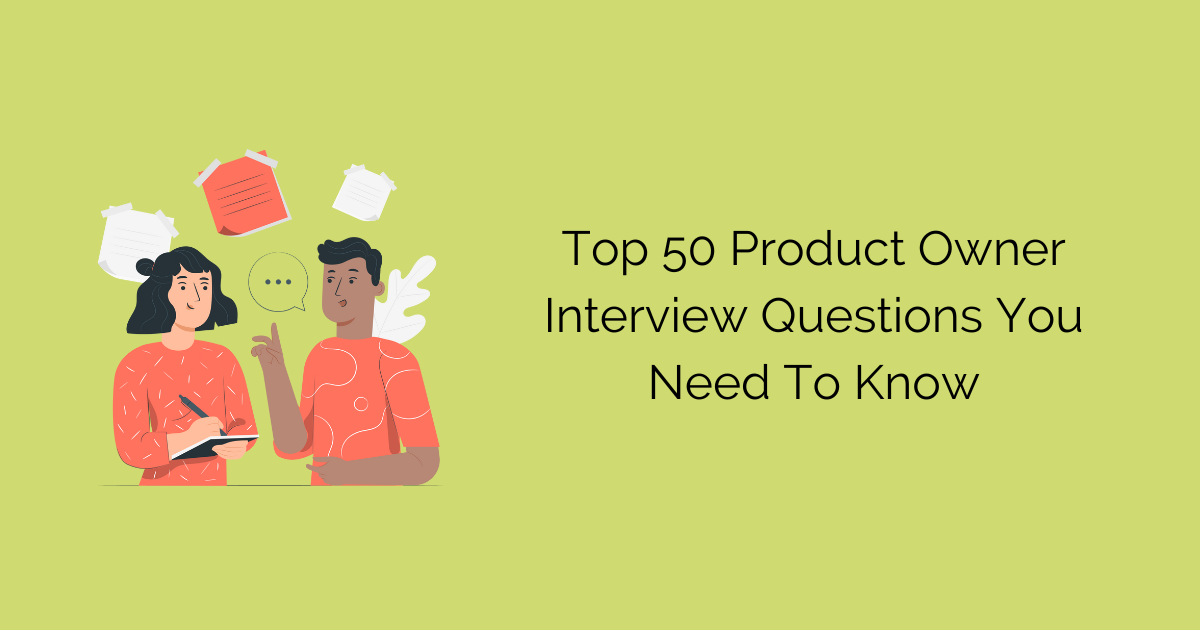Top 50 Product Owner Interview Questions You Need To Know
 Skillier Ltd
Skillier Ltd
As a product owner, you are responsible for the success of your product. You need to be able to communicate with stakeholders, understand customer needs, and prioritize features. As a product owner, you are responsible for the success of your product. You need to be able to communicate with stakeholders, understand customer needs, and prioritize features. In order to be successful in this role, you need to know how to answer questions during an interview. In this blog post, we will discuss the top 50 product owner interview questions that you need to know. We will also provide tips on how to answer these questions effectively!
What do you think are the most important qualities of a successful product owner?
How would you prioritize features for a new product launch?
How would you handle customer feedback on an existing product?
Describe your experience with Agile methodology and how it has impacted the way you work.
What processes have you used to define and measure success for a product?
How familiar are you with A/B testing tools and their results interpretation?
How would you collaborate with multiple stakeholders in order to reach consensus on a feature set?
Tell us about an experience in which you had to make difficult decisions under pressure related to a product launch.
How do you keep up with the latest trends in the industry and use that knowledge to inform your product decisions?
Describe a situation where you had to manage competing demands from stakeholders on different aspects of the same project.
What tools have you used for customer segmentation and feature prioritization?
How do you ensure business objectives are aligned with user needs when making product decisions?
Describe an experience in which you had to make a trade-off while designing a feature or product iteration.
How would you handle conflicts between stakeholders over features or design elements of a product?
How would you gather feedback from customers on a product or feature and use it to make improvements?
Have you ever implemented changes that had an unexpected negative outcome and how did you handle the situation?
Describe your experience with user research techniques and how they can help inform product decisions.
How have you managed time-consuming tasks while still meeting deadlines?
What processes or tools do you use to track progress on products and features?
Give us an example of when you took initiative to improve the customer experience with a product or feature set.
How do you collaborate with engineering teams in order to ensure successful delivery of a product or feature set?
Tell us about a time when you had to make a hard decision that didn’t please everyone.
How do you ensure that all stakeholders are kept informed on product decisions?
Describe your experience with competitor analysis and how it can be used to inform product strategy.
How would you handle a situation in which customer feedback was conflicting?
What processes have you used for prioritizing features based on user needs and business objectives?
Explain the concept of Minimum Viable Product (MVP) and how it has shaped your approach to product development.
How have you handled disagreements between stakeholders over features or design elements of a product?
Describe an experience in which you had to make a difficult decision based on conflicting information.
How have you used data analysis techniques to inform product decisions?
Describe a situation in which you had to manage competing demands from different stakeholders on the same project.
What processes do you use for validating assumptions and testing hypotheses related to product development?
How familiar are you with user stories and how did they shape your approach towards feature prioritization?
Describe an experience in which you successfully launched a new product or feature set?
Have you ever implemented changes that had an unexpected positive outcome and how did you handle the situation?
Tell us about an experience in which you had to tackle challenges related to a product launch.
How do you ensure the customer experience is taken into account when making product decisions?
Describe your experience with measuring success metrics for products or features and how they can be used to inform decision-making.
What processes or tools do you use for user segmentation and feature prioritization?
How have you managed competing demands between stakeholders on different aspects of the same project?
Give us an example of when you successfully collaborated with engineering teams in order to ensure successful delivery of a product or feature set?
Describe your experience in dealing with difficult decisions under pressure related to a product launch.
How do you ensure that customer feedback is taken into account when making product decisions?
Describe an experience in which you had to make a trade-off while designing a feature or product iteration.
What processes have you used for measuring customer satisfaction or user engagement with a product or feature set?
Tell us about an experience in which your team had to handle conflicting user feedback on the same project.
Give us an example of when you took initiative to improve the customer experience with a product or feature set without being asked by stakeholders?
Describe your experience in gauging market trends and how it can be used to inform product strategy.
How do you ensure that product decisions are data-driven?
Describe an experience in which you successfully launched a new feature set or product iteration with limited resources.
By understanding these top 50 product owner interview questions, you can ensure that you have the skills and knowledge necessary to be a successful product owner. Being prepared for these questions will help you demonstrate your competency to the potential employer and show that you are the right fit for the role. Having an understanding of the product development process, customer feedback and data-driven decisions will give you the edge when it comes to securing a job as a product owner. With this information in hand, you will have a better chance of getting hired and creating an impactful product. Good luck with your job search!
The Certified Scrum Product Owner (CSPO) certification is essential for anyone looking to demonstrate their knowledge of agile product management. Becoming Certified Scrum Product Owner isn’t easy but following the steps outlined above will help make it more achievable. Check out Skillier’s course on certified scrum product owner today. If you’re interested in learning more about agile or becoming a product owner. And be sure to follow us on Facebook and LinkedIn for the latest news and updates!
Subscribe to my newsletter
Read articles from Skillier Ltd directly inside your inbox. Subscribe to the newsletter, and don't miss out.
Written by

Skillier Ltd
Skillier Ltd
We believe a skillier and educated world is a better world. We help professionals across industries and sectors develop new expertise through our best-in-class technology training. Our top-notch online instructor-led programs are interactive, engaging, and effective.